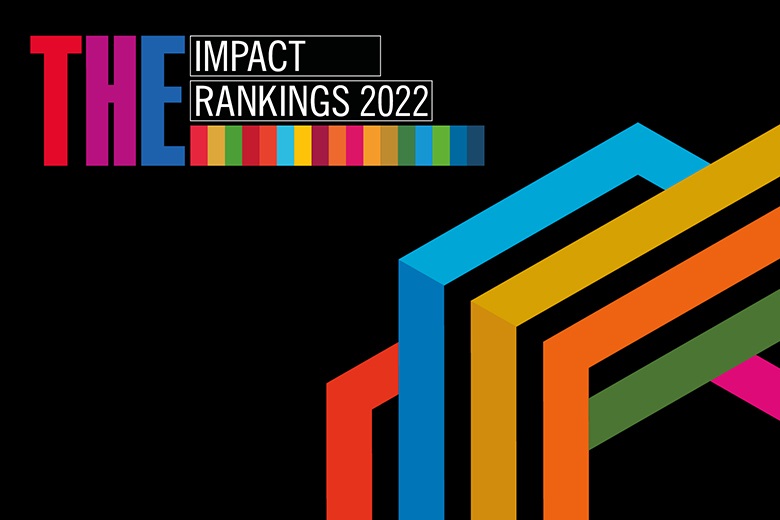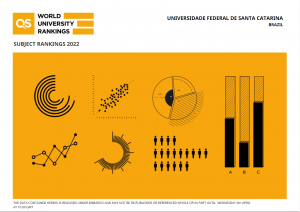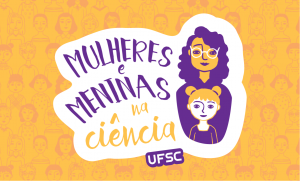All administrative and academic units at the Universidade Federal de Santa Catarina (UFSC) and the Polydoro Ernani de São Thiago University Hospital (HU) shall resume full in-person activities starting from 4 April 2022. The determination is included in the Normative Ordinance no. 430/2022/GR, of 15 March 2022. With this, all technical and administrative staff, as well as faculty members holding administrative positions, shall return to on-campus work. In-person classes, however, will start on the dates set out in the 2022 academic calendar: 18 April for undergraduate programs.
For the return to in-person activities, proof of vaccination against Covid-19 is required, as well as the use of face masks in all indoor settings at the university.
The required proof of vaccination extends to all “faculty and staff; temporary staff; substitute, visiting and volunteer faculty; amnestied civil servants; researchers and/or research fellows; outsourced workers; interns; as well as students of all levels of education”.
Expectation and seriousness
 “The division of the university life into three phases was a measure implemented in 2020, when there was a lack of information about how to face the Pandemic. It was a collective construction, and a decision of the University Council (CUn). Over time, we kept updating it with information from the Permanent Commission for Epidemiological Monitoring, as we decided to move forward in the phases. This last stage, Phase 3, for which we have been preparing since 2020, begins with great expectation, but also with the seriousness of those who know that the Pandemic is not over yet, and does not end by decree. So, yes, we are returning, but with a conscience for a safe living together”, emphasizes the Rector Ubaldo Cesar Balthazar.
“The division of the university life into three phases was a measure implemented in 2020, when there was a lack of information about how to face the Pandemic. It was a collective construction, and a decision of the University Council (CUn). Over time, we kept updating it with information from the Permanent Commission for Epidemiological Monitoring, as we decided to move forward in the phases. This last stage, Phase 3, for which we have been preparing since 2020, begins with great expectation, but also with the seriousness of those who know that the Pandemic is not over yet, and does not end by decree. So, yes, we are returning, but with a conscience for a safe living together”, emphasizes the Rector Ubaldo Cesar Balthazar.
The return planning observes the recommendations of the Permanent Commission for Epidemiological Monitoring, constituted by the Normative Ordinance no. 882/2021/GR, and considers the content of the Normative Resolutions no. 140/2020/CUn and 149/CUn/2021, as well as of the Resolution no. 06 /2021/CUn, of 30 March 2021.
As for the teaching activities, Phase 3 has already begun in the Colégio de Aplicação [Laboratory School] (CA) and the Child Development Center (NDI) on 10 and 14 February, respectively. Graduate academic activities are being resumed in the university since 7 March.
“The ongoing experiences in the university sectors [that have entered Phase 3] taught us about the importance of being careful with the use of masks in the workplace, as well as the importance of actions indicated by the researchers, such as the measurement of CO2, which made it possible to create occupancy parameters regarding air quality in the classrooms, and the testing policy, which has been in place for several months. In Phase 3, we will maintain these policies, expand them wherever is possible and continue evaluating our decisions,” explains the Prorector for Undergraduate Studies, Daniel Vasconcelos.
Risk Groups
According to the Normative Ordinance no. 430/2022/GR, the activities at UFSC in all its spheres become essential activities, within the scope of the Normative Instruction no. 90/2021, issued by the Ministry of Economy. Therefore, the Risk Groups for in-person work are suspended, and the remote work modality at the University is also suspended from the publication of the Normative Ordinance.
An important UFSC tool to monitor the university community’s adherence to immunization was the registration of the proof of vaccination, made through an online environment developed by the Superintendency of Electronic Governance and Information and Communication Technology (SeTIC).
Based on this registration, we were informed that more than 16 thousand faculty members, staff members and students had vaccinated until 15 March. In percentages, 86% of faculty members and 78% of technical and administrative staff members have already reported their vaccination status. Another system developed by the SeTIC technicians is a QR-Code, which will make it possible to check, in the UFSC settings, if the user is up-to-date with vaccinations.
Parameters
In accordance with the initial definition, from 2020, progress to Phase 3 would occur in a scenario characterized by the end of the state of health emergency, availability of the vaccine, number of new cases decreasing for 60 days, and number of deaths equal to or less to one per week for 30 days. These parameters were continuously evaluated through the Active Dashboard of Epidemiological Data, and following guidelines from the commission of researchers.
According to the Central Administration of UFSC, what was decided in June 2020, through the Normative Resolution no. 140/2020/CUn, remains current. However, when the Scientific Subcommittee pointed out the indicators to be observed for the progress of phases in the management of the pandemic at UFSC, there were uncertainties regarding many aspects of Covid-19. The indicators did not include, for example, vaccination, which was only consolidated in Brazil at the end of the first semester of 2021.
Rector Ubaldo recalls that, after the approval of the Normative Resolution no. 140, issued by the CUn, permanent commissions for pedagogical, psychological and epidemiological monitoring were created at UFSC. The latter, thus, became responsible for monitoring and evolving the Pandemic framework and recommending decision support parameters.
The Commission has evaluated other parameters, in addition to those established in 2020: status of immunization of faculty, staff and, particularly, students; testing and isolation of positive cases; room ventilation; and continuous and universal use of efficient face masks N95 or PFF2 type). These new parameters were considered in the transition process between the phases for combating the pandemic.
The Normative Ordinance that announces the resumption of in-person activities for the entire university community was published in the UFSC Official Bulletin. Access it here.
Translated by SINTER/UFSC.
Read the original article here.
 The Times Higher Education (THE) has published the results of the Impact Rankings 2022, which assess universities against the 17 Sustainable Development Goals (SDGs) from the United Nations’ 2030 Agenda.
The Times Higher Education (THE) has published the results of the Impact Rankings 2022, which assess universities against the 17 Sustainable Development Goals (SDGs) from the United Nations’ 2030 Agenda.




 The Universidade Federal de Santa Catarina (UFSC) has stood out in the 12th edition of the
The Universidade Federal de Santa Catarina (UFSC) has stood out in the 12th edition of the  “The division of the university life into three phases was a measure implemented in 2020, when there was a lack of information about how to face the Pandemic. It was a collective construction, and a decision of the University Council (CUn). Over time, we kept updating it with information from the Permanent Commission for Epidemiological Monitoring, as we decided to move forward in the phases. This last stage, Phase 3, for which we have been preparing since 2020, begins with great expectation, but also with the seriousness of those who know that the Pandemic is not over yet, and does not end by decree. So, yes, we are returning, but with a conscience for a safe living together”, emphasizes the Rector Ubaldo Cesar Balthazar.
“The division of the university life into three phases was a measure implemented in 2020, when there was a lack of information about how to face the Pandemic. It was a collective construction, and a decision of the University Council (CUn). Over time, we kept updating it with information from the Permanent Commission for Epidemiological Monitoring, as we decided to move forward in the phases. This last stage, Phase 3, for which we have been preparing since 2020, begins with great expectation, but also with the seriousness of those who know that the Pandemic is not over yet, and does not end by decree. So, yes, we are returning, but with a conscience for a safe living together”, emphasizes the Rector Ubaldo Cesar Balthazar.

 11 February is annually marked by the International Day of Women and Girls in Science, which has been institutionally celebrated at UFSC since 2021. The University has been taking actions that aim at seeking gender equality in science and, consequently, at the institution. In the last year, UFSC established a committee to implement equity policies; launched a course for undergraduate students on the subject; and awarded women scientists. In 2022, new goals are set with the creation of a permanent and representative committee and the planning of new advances that can be institutionalized on a permanent basis.
11 February is annually marked by the International Day of Women and Girls in Science, which has been institutionally celebrated at UFSC since 2021. The University has been taking actions that aim at seeking gender equality in science and, consequently, at the institution. In the last year, UFSC established a committee to implement equity policies; launched a course for undergraduate students on the subject; and awarded women scientists. In 2022, new goals are set with the creation of a permanent and representative committee and the planning of new advances that can be institutionalized on a permanent basis. The Universidade Federal de Santa Catarina (UFSC) will require from all faculty, staff and other professionals working at UFSC a certification of complete vaccination cycle from the beginning of phase 2, which starts on 14 February. The measure
The Universidade Federal de Santa Catarina (UFSC) will require from all faculty, staff and other professionals working at UFSC a certification of complete vaccination cycle from the beginning of phase 2, which starts on 14 February. The measure 
